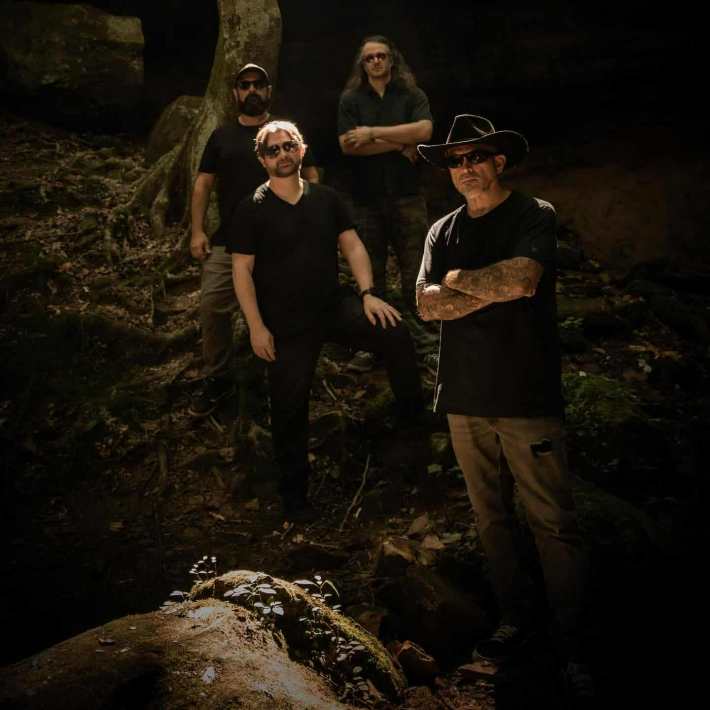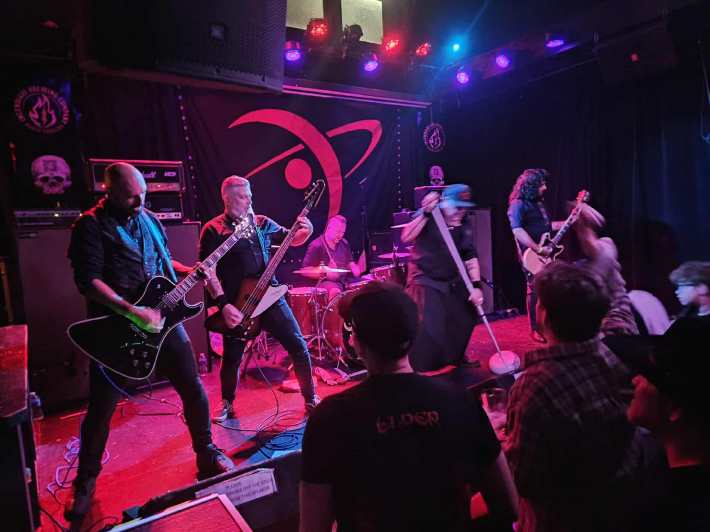Insomniac / Kal-El / Rainbows Are Free
Vanguard
October 29, 2025
Several canaries in our Zeitgeistical coal mine ago (i.e., this summer), I heard an interesting phrase on NPR. Right before the organization’s funding was slashed, Neda Ulaby interviewed journalist Rachel Donadio about the Italian concept of “cultivare l'orticello”—literally, “to tend one’s own garden”—in times of uncertainty. Donadio introduced the phrase as an approach many Italian writers and cultural figures are taking in response to rampant political chaos. Tending one’s own garden is a way to focus on what we actually can change around us, to retreat into what’s actually nourishing instead of surrendering to the barrage of awful news.
I took this interview personally. After seeing my own health take a beating in the past few years in the face of that barrage, I’ve started asking myself: What is my own garden, anyway?
One constant is, obviously, music—specifically the support networks I’ve made through music over the decades. I’ve written before about the "family reunion” that is global metal; as a touring musician myself, I appreciate every inside joke I have with friends who’ve hosted me around the country, every breakfast michelada shared, every late night watching Robocop from the comfort of my sleeping bag on their floors. And I especially appreciate the ones like Amos Rifkin: a consistent tender of his own garden and an example of how to do life well.
If you’ve ever banged your head to a touring band at Whittier Bar, there’s a good chance Rifkin sent them. In addition to drumming for death metal legends Deceased, he’s stacked Tulsa venues with heavy bands through his Atlanta-based booking agency for over a decade. The last time my band, Blind Oath, visited Atlanta, Rifkin took us on a walk through a cemetery that’s sacred to him, and led me through a full moon ritual of his own before our show.
Rifkin’s been checking in during the past few months, as I’ve been tending to my garden by taking up boxing, losing 30 pounds, abstaining from booze during the week, lowering my screen time in favor of actual books, and hitting the gun range. When I heard he was coming to the Vanguard with his new band Insomniac—on a bill with Norwegian doomers Kal-El and Norman, OK’s Rainbows are Free—I knew reconnecting with him through his music would be a healthy dose of compost on my lovingly weeded garden. (I’ve also learned how to actually garden in the last year, so comparing my friend to fertilizer is a compliment.)
For Rifkin, a practicing Buddhist, Insomniac became a spiritual vessel long before he realized it. “Every time we’d play, it was like connecting to something so much bigger and lowkey meditating in that space and making a big physical offering through it,” he told me. The band’s debut, Om Moksha Ritam, mirrors the rise and fall of a psychedelic journey, its sound carrying the story before the lyrics do. Named for a mantra that first gave Rifkin a tangible sense of liberation—“roughly translating as freedom through merging with the rhythm of the universe,” he said—the album and the band mark his path toward awakening.

Insomniac formed out of Atlanta’s DIY scene, where Rifkin met the other members through years of punk shows, DJ nights, and shared rehearsal spaces, weathering a pandemic together and finally releasing their debut album this past summer. Sadly, their guitarist Mike Morris passed away this year, just as those seeds started to bear fruit.
At Vanguard, Rifkin started the Insomniac set by ringing a bell and announcing “all past, present, and future Insomniac shows will be in the honor of Mike Morris.” He offered a brief Buddhist prayer before the band started a thundering pan-instrumental drone.
Set (and album) opener “Meditation” unfolded like an oppressive storm cloud over a cracked desert, with pounding drums and a long, meditative dirge stretched across the chords. Rifkin’s cymbal flourishes evoked the sparse and spiky flora of that harsh landscape. The group gradually gathered fury and rhythmic subdivision before breaking into a straight-ahead gallop, ending in a swirl of twisting guitar sonics and winding drum fills, the glinting metal of cymbals punctuating the wall cloud like spider lightning.
You know that drunk dude that crashed his truck into the world’s most isolated tree in Niger back in ‘73? This might have well been his soundtrack.
Insomniac’s second track opened with a spindly, melancholic guitar rumination, each note punctuating the air like raindrops on a still pond, before collapsing into a hammer-blow downfall. As I sat on the downstairs benches of the Vanguard with my back pressed to the wall, the bass sent waves through the floorboards and straight into my bones.
Their last song of the night, “Awakening,” brought home the full dimensions of the inspiration, support, and ferocious hope that this music delivers, especially when experienced live. Written and recorded with the band’s late friend Mike, the song’s rising vocal mantras—“I STILL FEEL YOU” and “I WILL FIND YOU”—resounded in a hallowed way.
Insomniac is part of my life’s garden. But as the other bands on the Vanguard bill showed, there’s so much music out there that can help us be more grounded, meditate more deeply, voyage further into connections we might never have made otherwise. Norwegian space rockers Kal-El followed with a low-end assault heavier than a kryptonian haymaker. Reminiscent of early Clutch, the Scandinavians eschewed that outfit’s verbose lyricism for a sense of space shuttle cruise, where controls were set to the dark side of the moon. Rainbows are Free opened the show with their riffcentric psych assault—eternally Sabbath-reverent, but increasingly trenched in the sonic caves of Cirith Ungol. They’ve been forging their own steel since 2007, and from literally just down the Turnpike in OKC/Norman.

The culmination of this show’s musical, emotional, and spiritual heaviness hit me in the stomach and sent me into a grinning reflection. Through music, I’ve made lifelong friends on every coast, all with their own levels of community engagement and skills for resistance: homesteaders in the PNW and Pittsburgh, health care specialists, survivalists, adepts at urban exploration, and friends in other countries who’ve offered to help if the bottom truly falls out of our own. Rifkin has suggested making a compound in Atlanta if the country goes full Mad Max, since between his touring services he “has the vans.”
I’ve met all these folks through experiencing their music, exchanging energy, hospitality, and enthusiasm. Through tending my musical garden, and seeking out others who are tending theirs, I’ve sown the roots of certainty in a turbulent time.
I wasn’t able to stay up late and kick it with the Insomniac boys after the show, but I saw them over coffee before they hit the road. They had only a few more shows before they’d be heading home. Once they were well on their way, I got a message from Rifkin, checking in: “How are we doing out there?”






